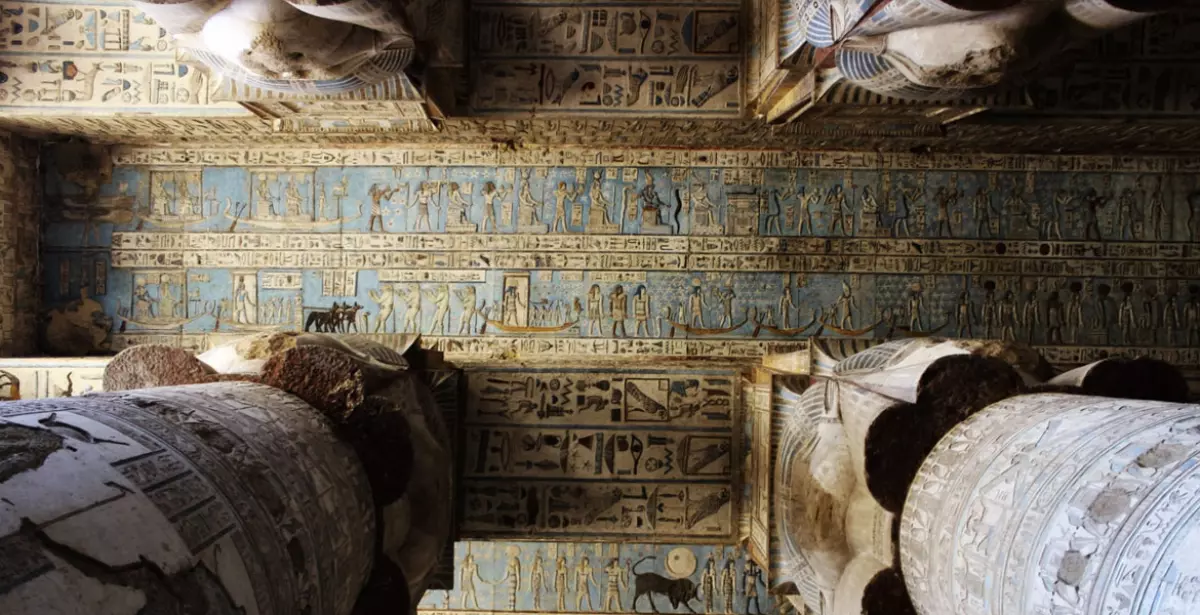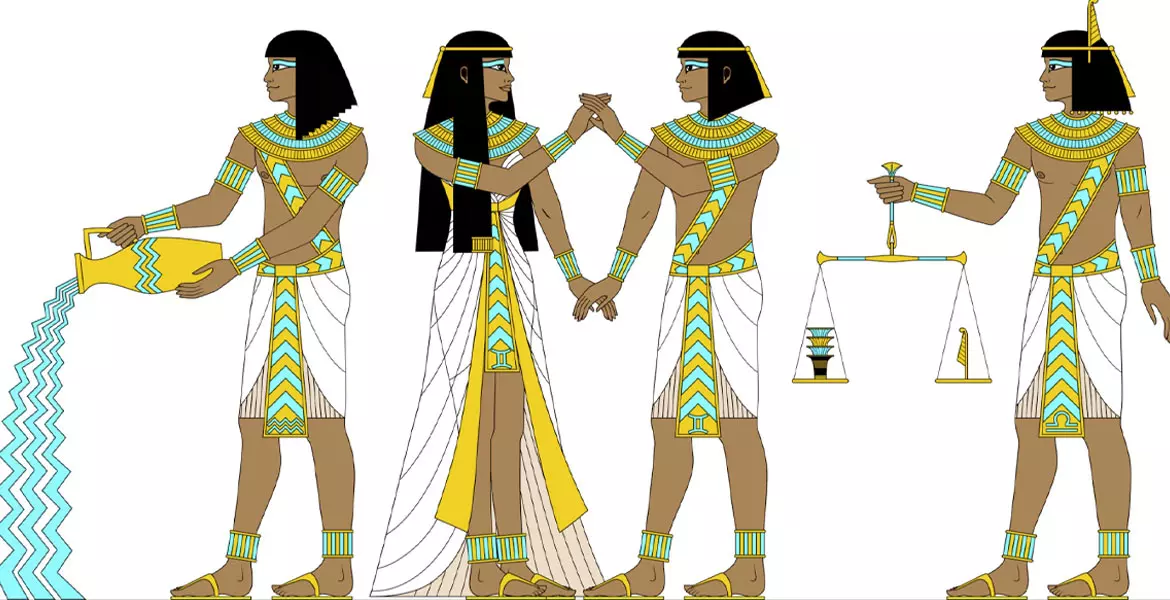Since ancient times, people have gazed up at the sky, marveling at the stars and planets, searching for meaning in their celestial dance. Astrology, a blend of science and magic, emerged over three millennia ago and continues to captivate us today. Among the ancient cultures that developed complex astrological systems, Egyptian astrology stands out with its intriguing similarities to modern astrology. In this guide, we will explore the milestones of ancient Egyptian astrology and delve into the enchanting world of Egyptian zodiac signs.
Ancient Egyptian Astrology: A Cosmic Connection
In the early days of Egyptian astrology, temple priests meticulously observed and documented the movements of stars and planets. They sought to understand how these celestial bodies influenced the Earth's environment. By predicting natural phenomena like famines and floods based on solar movements, they showcased an impressive understanding of the cosmos.
To emulate the heavens, ancient Egyptian temples featured arched ceilings, and rituals were meticulously scheduled to align with planetary activity. During the Ptolemaic dynasty, which spanned from 305 to 30 BC, the Egyptians adopted the Greek zodiac designation system and assigned Egyptian gods to each zodiac sign, further enriching their astrological traditions.
The Egyptian Calendar and Astrology: A Solar Connection
The ancient Egyptian calendar resembled the Gregorian calendar we use today, with 365 days divided into three seasons of 120 days each. Each season comprised four months of 30 days. But wait, what about the remaining five days? The resourceful ancient Egyptians added a five-day month outside of the standard year. While the twelve months were usually numbered, they were occasionally named after significant festivals.
Within each month, the ancient Egyptians further divided time into three 10-day periods called decans. The last two days of each decade were designated as days off for the royal craftsmen. This division of time was deeply intertwined with Egyptian astrology, as it corresponded to the 36 asterisms that rose every 24 hours.
 Caption: The ancient Egyptian calendar faithfully followed the movements of the Sun and the stars.
Caption: The ancient Egyptian calendar faithfully followed the movements of the Sun and the stars.
Timekeeping in Ancient Egypt: Ancient Timepieces
Early Egyptians made significant strides in timekeeping. They devised a system of temporal hours, with the length of an hour varying throughout the year depending on the season. Summer hours were longer than winter hours to reflect the varying periods of daylight. Remarkably, the Egyptians were the first civilization to establish a 24-hour day.
To measure time, they used innovative tools such as shadow clocks and water clocks. As the day unfolded, shadows and water movement served as reliable indicators of the passage of time. These early timekeeping devices exemplified the Egyptians' thirst for knowledge and their dedication to organizing their lives in harmony with the cosmos.
Egyptian Astrology Signs: Unveiling the Zodiac Deities
Similar to the Western zodiac, Egyptian astrology comprises twelve signs, with each sign aligning with specific days of the month. However, the Egyptians named their zodiac signs after their gods and goddesses, each carrying unique characteristics believed to influence the individuals born under their respective signs. Let's explore the captivating world of Egyptian astrology signs together.
 Caption: The Egyptian zodiac, a tapestry of deities and their divine influence.
Caption: The Egyptian zodiac, a tapestry of deities and their divine influence.
1. Nile
Dates: January 1-7, June 19-28, September 1-7, November 18-26
The Nile, the lifeblood of ancient Egypt, gives birth to the first sign without representing a deity. People born under the Nile sign possess logical minds, peacefully seeking to maintain harmony in their surroundings. While passionate, their wisdom guides them through life, and their acute observation skills grant them a heightened intuition.
2. Amun-Ra
Dates: January 8-21, February 1-11
Amun-Ra, the king of the gods, reigns as the second Egyptian zodiac sign. Those born under this sign exude confidence, politeness, and optimism. Naturally inclined toward leadership, Amun-Ra individuals possess a remarkable ability to keep things under control and make wise decisions.
3. Mut
Dates: January 22-31, September 8-22
Mut, the mother of the world, safeguards humanity as the third zodiac sign. Born under the Mut sign, individuals display sensitivity, loyalty, and generosity. With a strong focus on their goals, Mut individuals make determined strides towards success. They excel in nurturing and protecting others, often embracing the roles of loving parents.
4. Geb
Dates: February 12-29, August 20-31
Geb, the Egyptian god of the earth, embodies the fourth sign. Known for his laughter that triggers earthquakes, Geb individuals radiate faithfulness, openness, and sensitivity. Their emotional nature attracts others, and they are sought-after as reliable friends. Although they may appear reserved, their persistence emerges when the situation demands it.
5. Osiris
Dates: March 1-10, November 27 - December 18
Osiris, the god of the underworld and resurrection, symbolizes the fifth Egyptian zodiac sign. Individuals born under this powerful sign possess strength, intelligence, vulnerability, and independence. Osiris individuals naturally become strong leaders, with an unwavering determination to achieve their goals. Their straightforward nature ensures their thoughts and intentions are always known.
6. Isis
Dates: March 11-31, October 18-29, December 19-31
Isis, the goddess of nature, guides those born under the sixth Egyptian zodiac sign. Honest, sociable, and romantic, Isis individuals possess an excellent sense of humor. Their affable nature equips them well for teamwork, and their easy-going demeanor makes them approachable to all.
7. Thoth
Dates: April 1-19, November 8-17
Thoth, the god of learning and wisdom, represents the seventh Egyptian astrology sign. Romantic, wise, energetic, and courageous, individuals born under this sign display an insatiable thirst for knowledge. The pursuit of self-improvement and inventive ideas is their driving force.
8. Horus
Dates: April 20 - May 7, August 12-19
Horus, the god of the sky, emerges as one of the most powerful Egyptian zodiac signs. Courageous, ambitious, and optimistic, Horus individuals make practical and wise leaders. They inspire and motivate others, effortlessly forming strong connections with people around them.
9. Anubis
Dates: May 8-27, June 29 - July 13
Anubis, the god of mummification and guardian of the underworld, presides over the ninth sign. Confident and curious, Anubis individuals possess a strong work ethic and creative spirit. While they excel when working alone due to their introverted personalities, their confidence shines brightly.
10. Seth
Dates: May 28 - June 18, September 28 - October 2
Seth, the god of chaos and violence, represents the tenth Egyptian zodiac sign. Individuals born under Seth's influence embody perfectionism and boldness. They crave challenges and possess exceptional communication skills. Natural charmers, they thrive in the spotlight, captivating the attention of those around them.
11. Bastet
Dates: July 14-28, September 23-27, October 3-17
Bastet, the goddess of cats, fertility, and pleasure, emerges as one of the female zodiac signs. Those born under Bastet's gentle influence actively seek balance and avoid conflict. Charming, affectionate, and sensitive, Bastet individuals possess an unmistakable intuition and unwavering loyalty in their relationships.
12. Sekhmet
Dates: July 29 - August 11, October 30 - November 7
Unveiling the twelfth sign of the Egyptian zodiac, one encounters Sekhmet, the goddess of war. Sekhmet individuals exhibit a dual nature, blending discipline with a carefree spirit. Their pursuit of justice and perfectionism defines them, showcasing their natural leadership abilities.
Now that we've unveiled the captivating world of Egyptian astrology signs, take a moment to explore the characteristics of your birth sign and delve deeper into the mystical connections between the heavens and humanity. The ancient Egyptians left us with a rich legacy, reminding us of the enduring fascination with the stars that has captivated humanity for centuries.














